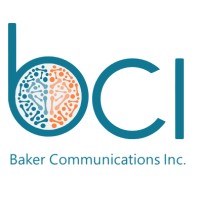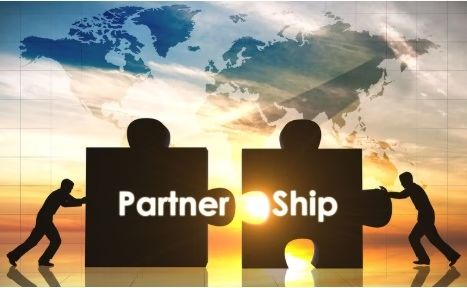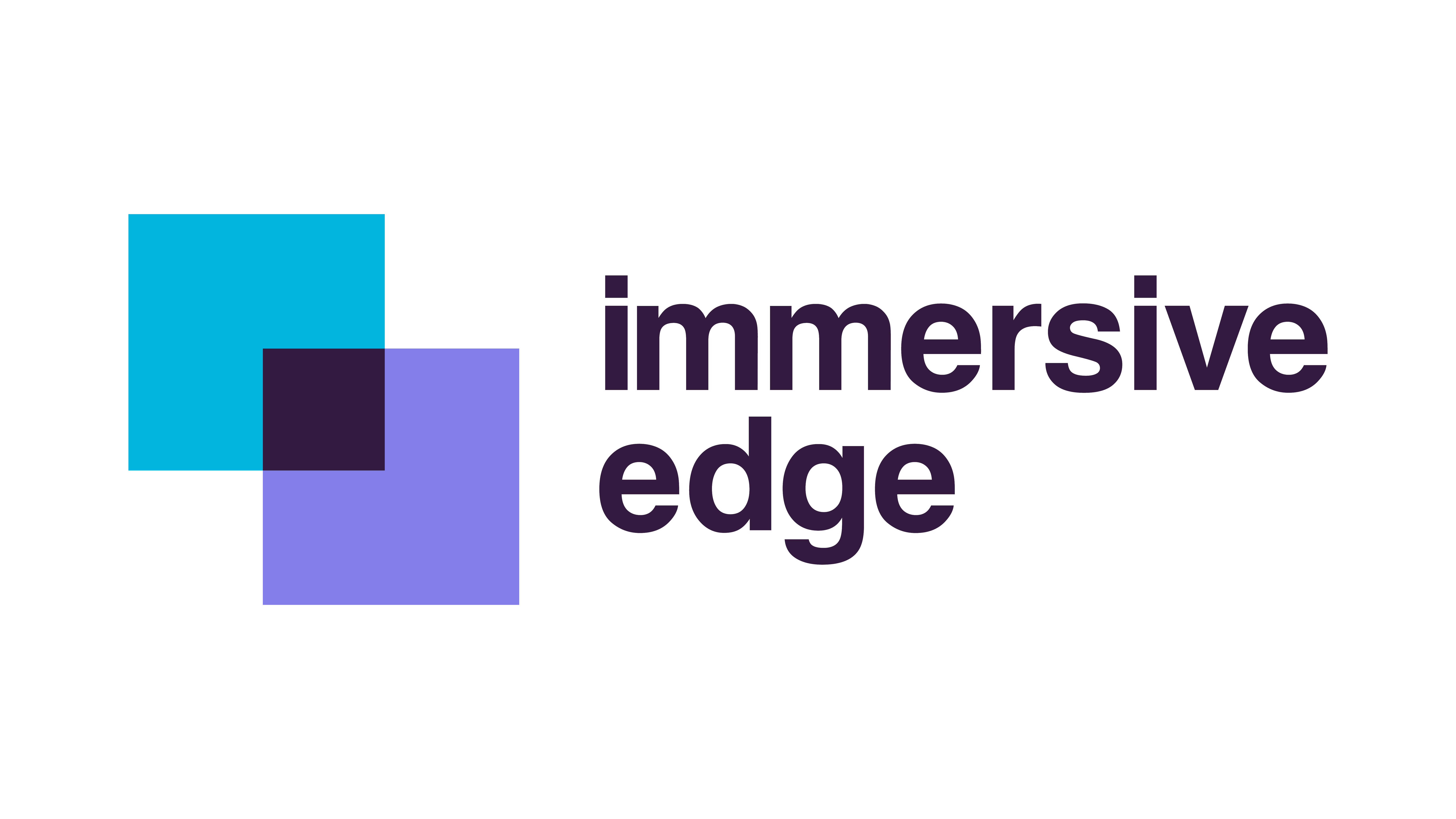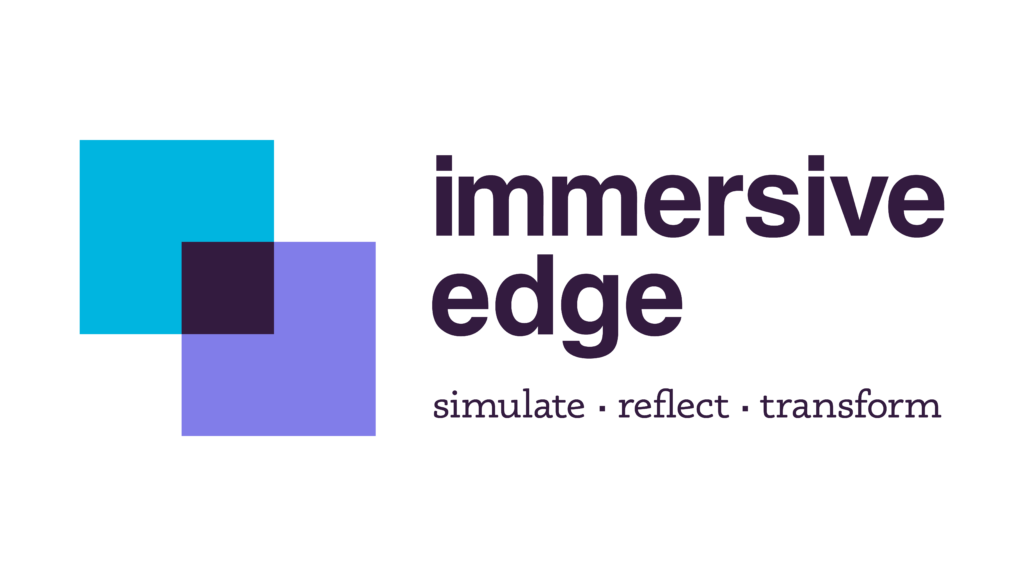Case Study
Business simulations for leadership development


Written by
Elton Daddow
Commercial & Training Director, Immersive Edge


Preface
Elton Daddow
In 2022 Baker Communications Inc. (BCI) began a conversation with Immersive Edge Founder and then CEO Tim Dew about the potential for business simulations implementation as part of a broader leadership development programme rollout with one of the largest global airlines based in the United States.
As a trusted delivery partner, BCI had identified the opportunity through ongoing discussions with key stakeholders in the learning and development team of the airline.
This case study explores the collaborative, progressive and ambitious approach to bringing experiential learning into a newly formed ‘Leadership Institute’ between BCI, Immersive Edge and the Airline’s key stakeholders.


Contents
- Why do Leadership Skills Matter?
- Simulation Delivery: Agreed Approach
- Simulation Delivery: How it works
- Meet the Facilitators
- Agility Lab Takes Off: Sessions 1-3
- Team India Showcase: Session 4
- Final Three Teams: Sessions 5-7
- Feedback
- Facilitator Reflections
- Interested in Finding Out More?
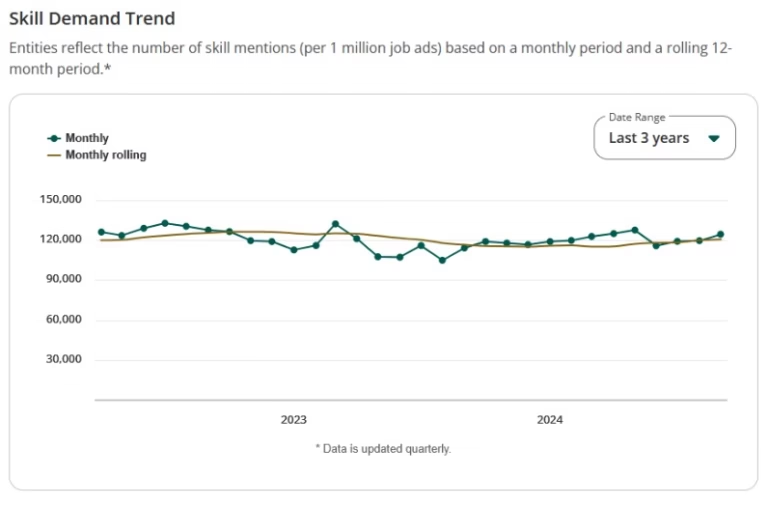
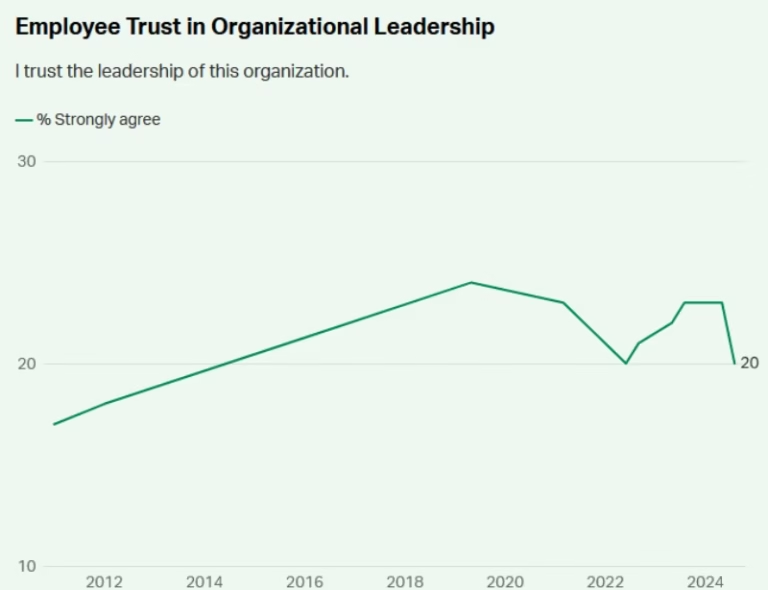
Why do leadership
skills matter?
What is it?
Leadership, both as a research area and as a practical skill, encompasses the ability of an individual, group or organization to lead, influence or guide other individuals, teams, or entire organizations.
The graph to the left represents the US demand for ‘leadership’ as a specific skill, based on number of skill mentions per 1 million job ads. (source: Credly by Pearson)
Trust in leadership & management
The bottom graph represents the measurement of US employees’ perceptions of their interactions with leaders and managers, as well as their experiences related to performance management in their organization.
(Source: Gallup)

Simulation Delivery: agreed approach
The airline had developed an innovative new Leadership Institute, which empowered its employees to take charge of their own development and develop their broad range of leadership skills, such as executive presence, innovation and agility through a variety of instructor-led trainings, leadership programs, and eLearning elective modules.
The program is self paced, customizable and offered as a core way to direct their own development, at their own speed, and work towards earning a Leadership Institute credential.
The ‘Agility Lab’ sessions, completed over a 5.5 hour online time frame using Immersive Edge’s Boardroom simulation, counted towards earning a Leadership Institute credential.
It was agreed between the airline, BCI & Immersive Edge that the airline would attend the sessions to observe participants in action and support the development and refinement of the sessions to continuously improve the output for the participants as the partnership continued to grow.
Facilitators attributed scores to each team based on 8 competencies (1 of which is shown in the image on the right) with a total score out of 40 recorded for each team based on their performance in the simulated environment.
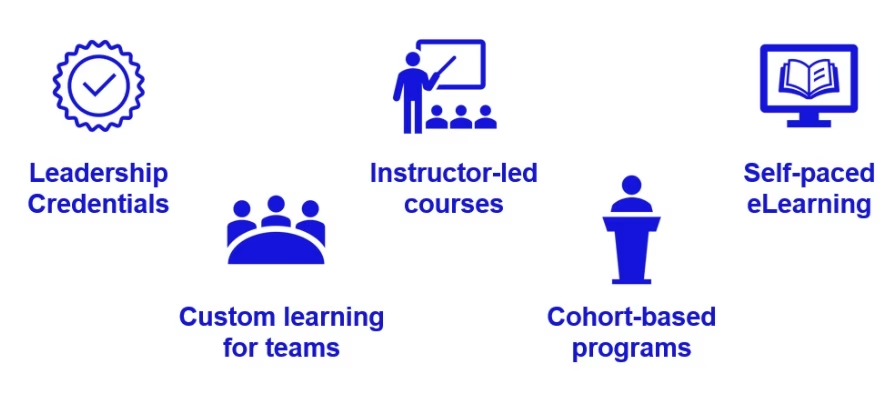

A full written report was submitted in the days following each session with participant feedback gathered and key learnings summarized.
Employees were given an introductory online overview presentation of the business simulations including:
- What experiential learning is, and its many benefits.
- The science behind Immersive Edge business simulations
- Gate of Acceptance: Interoperability of key business functions and how they drive productivity effectively together through collaborative, effective teamworking
- Overview of the Boardroom.Inc business simulation
Participants were assigned simulation roles, given an overview of the company handbook and time to read their onboarding guides, shown a walkaround level by the facilitator, a cradle to grave process of a marketing qualified lead going through the departmental flow to being an invoiced piece of work.
Level 1 of the simulation gameplay followed by valuable reflective periods and strategizing sessions. Facilitators discussed key aspects of performance through trading, process and production reports and statistics. Levels 2 & 3 followed the same pattern with a longer ‘landing the plane’ closing discussion to tie all the simulation learnings back to real-world working worlds for each participant.
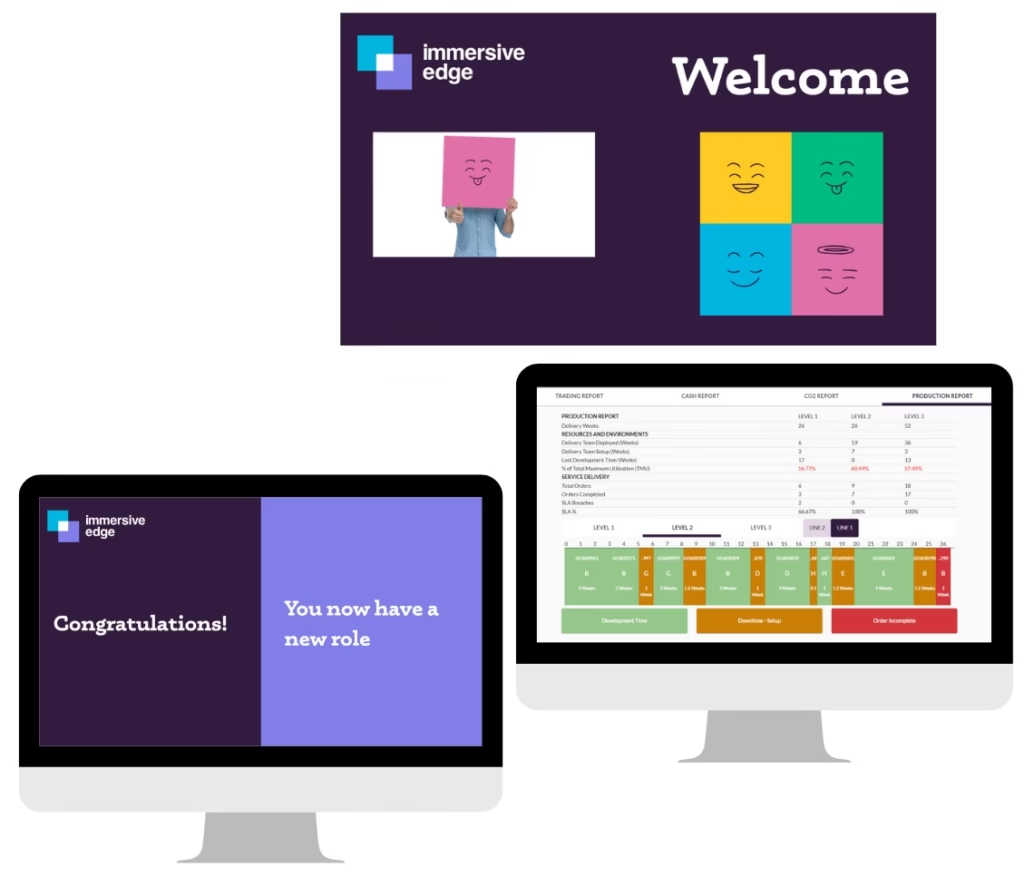
Simulation Delivery: how it works
Immersive Edge business simulations are designed for 5-15 people, to be played over 3 levels of gameplay, with reflective periods between levels, built on David Kolb’s Experiential Learning Cycle, explained in more detail here.
We use game technology to create a business environment with departments, and typical interactions. Participants are assigned the below roles within the simulation, with 1-3 players in each role/department.

A really integral part of the accelerated learning in the simulations is that when the game starts, 26 weeks of company trading happens in just 26 minutes!
During the gameplay, facilitators are observing people, individual behaviours and how they’re going about doing things and performing tasks. Are they good a persuading people of the priorities? Have they understood the complexity of the problem? Are they working as a team, utilising the brains around them to help solve the problem? What strategy is emerging? How are people communicating with on another? Is if effective? What company culture is emerging? Who is showing leadership qualities?

Agility lab takes off
Sessions 1-3

Kicking off online in October 2024, the very first airlines leadership team entered the online Teams room where their facilitator was eager to greet them for 5.5 hours of ‘Agility Lab’ Immersive Edge Boardroom simulation gameplay, learning and fun. 2 further teams were to have their turn in the months that followed.
Here’s a summary of the combined learnings taken from all airline employees that they could translate into direct actions in the workplace thereafter.
- “Establishing Effective Communication Channels is Important”: Understanding the need to engage with stakeholders on any specific projects using communication channels and styles which are going to result in the most productive and efficient project management outcomes.
- “Consider the Impact of Decision-Making on Other People/Departments”: A key learning developed through the simulation experience, this gave rise to participants openly expressing how they had learned a lot about the impacts of their decisions and actions on other people and departments.
- “Joined up Leadership Leads to Greater Productivity”: Whilst there are clearly defined leadership roles and functions (i.e. CEO), leadership-based decision-making can be shared across all layers of an organization as evidenced in the simulation experience.
- “We must Identify Bottlenecks and Address as a Team”: Identifying, agreeing and implementing process improvements, learning by doing and trying something new, had a demonstrable effect on performance. This can serve as a valuable lesson in the real-world workplace.
- “Getting Team Members on Board with Strategic Changes Moves us Forward Together”: Canvassing opinions of all staff with regards to important matters of strategic change increased likelihood of buy-in and commitment to achieving success. Team members got to be heard and once issues were discussed fully, could move forward as a team.
- “Importance of Humour in the Workplace”: This was highlighted as being important to building trust and a supportive culture of belonging, directly correlating to successful outcomes and productivity.
- “Considerations for Risk-Taking”: Important to consider all factors in taking a risk, ensuring everyone is on board and understands their role in making the risk pay off as a combined effort.

Team 1

Team 2
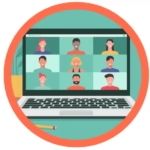
Team 3
Team India Showcase:
Session 4

Based on the success of the ever-evolving first 3 Agility Lab Boardroom sessions, the airline arranged a ‘pilot’ session with their team based in India in February 2025, which we’re showcasing as having exemplary output in terms of mapping the learnings from the simulated world back to real-world working worlds. All 10 participants were able to articulate two key takeaways to put into practice with immediate effect in the workplace.
All of the following were summarised as direct quotes from the debrief, with each participant articulating clearly and mapping events from the simulation learning experience that were directly attributable to their roles at the airline and due considerations, actions and ideas that they could take back to their roles as a result of the simulation session.
- “Pull“ rather than “Push“: If strategies and approaches and processes are only pushed down on colleagues, the productivity of the team is not as great as when all employees at all levels are pulling the ideas down from leadership which results in far greater buy in.
- “Know Your Products, Know your Production Capacity”: Whether delivering a product or a service, it’s hugely important to have sufficient understanding of the team and their capacity/capability to deliver before committing to entering into any formal agreement with a client to ensure optimum customer satisfaction and minimum adverse impact on colleagues expected to deliver.
- “Minimal, Timely Communication is a Plus!”: Communication for communication’s sake is not necessarily useful, helpful or productive. Whereby roles are clearly understood and established, and trust is built, the most effective communication through whichever channel is most appropriate can actually be fairly minimal on this basis. Less is more!
- “Importance of Integrated Cross-Functional Support”: There is nothing wrong with asking for help, and there is nothing wrong with offering help. A team who feels able to do both will have many positive outcomes for themselves and the organisation they work within.
- “The Impact of Building Trust”: Productivity increases directly as a result of having total trust in colleagues and departments. That trust grows as a result of working together, not in silos, and increases as teams understand both job functions and individuals’ roles and working styles within those functions.
- “Incremental Improvements Just as Important as Big Milestones”: Emphasis can too often be placed on major milestones/goals/achievements and more emphasis and importance can and should be placed on smaller incremental improvements and wins which lead ultimately to the achievement of those larger targets.
- “Preparing for Tasks that Take Longer than Anticipated”: In situations whereby tasks you are faced with may take longer than first anticipated, the potential knock-on effects of this on other departments are far-reaching. It is important to feel empowered to communicate possible changes in timeframes and expectations to others to drive better empathy and understanding.
- “Leadership is a Shared Responsibility”: It is really important to recognise how beneficial a flat structure is when it comes to everyone demonstrating leadership capabilities in equal measure.
- “Retrospection Leads to Improvement”: The need to stop to go faster through reflection, review and refining process, strategy and approaches ultimately leads to small and big wins rather than just looking forward all the time to ‘the next thing’.
- “Fail Fast, Fail Forward”: From a learning perspective, there is just as much to take from things that don’t work as celebrating things that have worked, and there is greater learning and personal growth and development associated with perceived failure in the workplace when it comes to moving forward and growing as a team.
- “Believe in Ourselves, Believe in Our Processes!”: Linked of course to trust also, the benefits of believing in one another and the wider team has multiple benefits on productivity and progression of a business in terms of it’s financial performance, culture and overarching health.
Future sessions are now under consideration based on the success of this initial trial and subsequent participant feedback.

Team 4


Team 4
Final three teams.
Sessions 5-7

Moving into early 2025 three more airline leadership teams played Agility Lab online, with more fantastic outcomes and learning experiences across the board.
Here’s a summary of the combined learnings taken from all airline employees that they could translate into direct actions in the workplace thereafter.
- “Choosing How to Communicate is Key”: With multiple options available through talking, online chat, breakout rooms, WhatsApp and separate teams chats it is important to establish an agreed method to increase efficiency when working across broader teams, and taking into account different people’s preferences for different communication styles and modes of operating.
- “We Must be in Alignment to the Agreed Strategy”: If strategies, approaches and processes are agreed, understood and appreciated by all, likely outcomes and achievements are likely to be greater, especially if we have a sound understanding of each other’s roles and job functions.
- “Don’t Stay in Your Lane”: Reaching out across boundaries to help others fosters a sense of ‘team’ over ‘individual’ and leads to a more positive working environment.
- “Importance of Cross-Functional Support”: There is nothing wrong with asking for help, and there is nothing wrong with offering help. A team who feels able to do both will have many positive outcomes for themselves and the organisation they work within.
- “Interactions, not Assumptions“: The ripple effect of even a small adjustment to a process or action taken can have really long-term impact and consequences. Knowledge sharing and alignment on decisions, out of the silo mentality, is far more productive through open communication as opposed to quietly making assumptions and not checking crucial information with colleagues.
- “Sacrificing Personal Time has Business Consequences”: Willingness to work through overtime to achieve a better outcome and support teammates is admirable, but if it became a habit or standard practice of doing business in order to keep up or stay afloat, there may be possible implications of burnout and stress to any individual or team over a period of time.
- “Understanding, Iterating and Improving Workflows”: Several of the functions had to work through challenges in getting their task to work. In these cases, teams were quick to keep trying different combinations and approaches and also flagged when they wanted a colleague from their function or the larger team to weigh in.

Team 5

Team 6

Team 7
Feedback
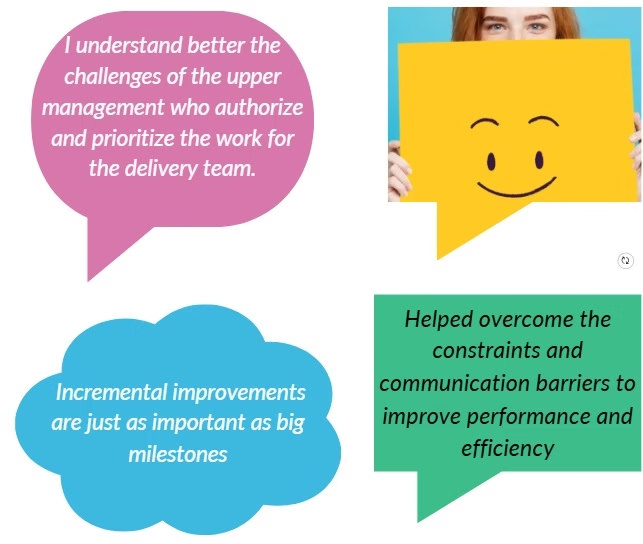
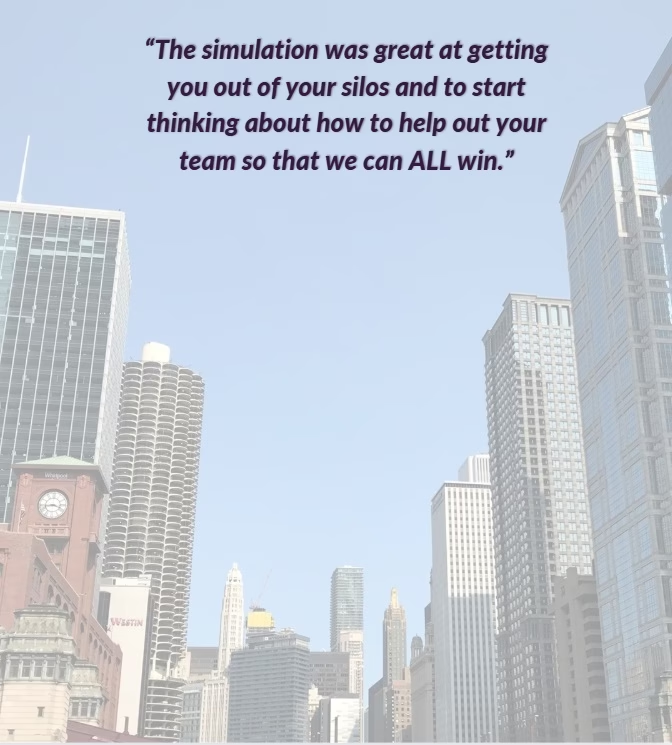
Facilitator reflections


Phillip Raskin
Facilitator
Baker
Communications Inc.
“The experience of facilitating online business simulation sessions with this client, coupled with the opportunity to partner directly with Immersive Edge, has been extremely fulfilling as well as a great learning experience. When I began collaborating on this project in late 2024, I was warmly welcomed into a very collegial leadership group. As such, all team members helped ensure I was fully integrated into the needs analysis discussions and the evolving simulation delivery.
It’s also been very gratifying to work with the airline’s leadership cohorts. Throughout, I was impressed with the supportive and positive approach that their employees brought to the sessions, and in part because of that orientation, they were able to make great progress in the simulation and work together to overcome numerous challenges.
The sessions provided ample opportunity for the airline’s staff to reflect upon the parallels with their real-world situations and work through actionable strategies that can help them succeed in their roles long after this simulation is completed. These long-term lessons should serve them well as they continue to develop their careers at the airline.”

Elton Daddow
Commercial & Training Director
Immersive Edge
“The whole process of working with this airline, and our trusted delivery partner BCI has been an absolute pleasure. I was a relatively new member of the Immersive Edge team back in 2023 and members of the teams made me feel fully part of the needs analysis conversation with great friendship.
What has been most impressive for me, through close partnership working, has been the evolution of our off-the-shelf Boardroom.Inc simulation to becoming something truly embedded in the airline’s Leadership Institute, progressing towards and full alignment to their learning outcomes as the 7 sessions have been conducted.
As a direct result, participants from all 7 sessions are able to confidently translate the learnings from the simulated environment into really tangible actions and embed these into their daily working worlds immediately after the sessions.
Furthermore, it has been immensely satisfying to see the success of the simulation delivery translated into a new market for the airline with broader market rollout possible in the future.”
Interested in finding out more?
If you’re seeking new ways to develop leadership and management potential within your organization, or looking more broadly at how to engage global workforces in innovative, immersive learning experiences with serious yet fun simulated learning experiences, get in touch with us to explore how experiential learning can be embedded as a core part of your training and development programmes, either via one of our existing simulations, or a customized version more specific to your training needs, at scale.
Sometimes you win, EVERY time you learn
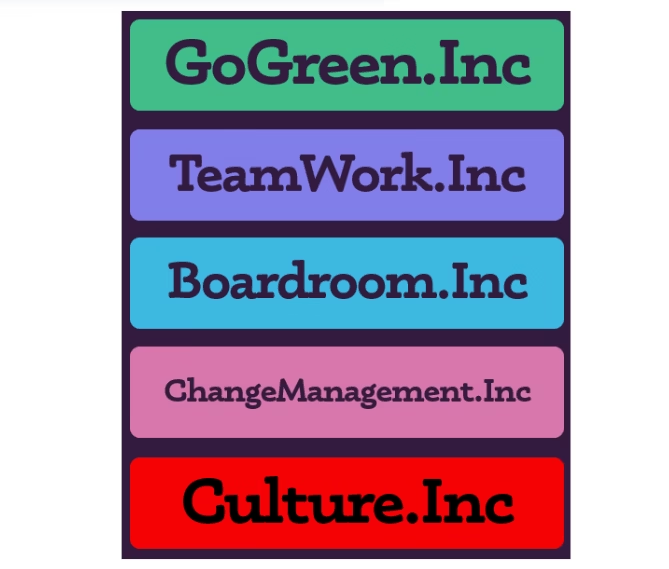
Download this Case Study: Airline Leadership Institute Case Study.
CONTACT US
A Case Study about your company?
Contact one of our facilitators and ask about the possibilities.

